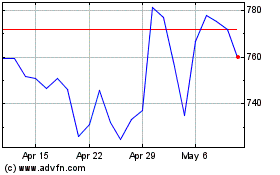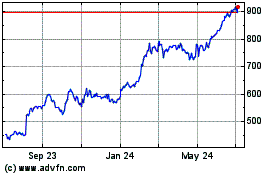Study of Eli Lilly Covid-19 Drug Paused Due to Safety Concern -- Update
October 13 2020 - 8:16PM
Dow Jones News
By Peter Loftus and Joseph Walker
A federally funded clinical trial testing an experimental Eli
Lilly & Co. Covid-19 treatment has been paused due to a
potential safety concern, the company said.
The study, which started in August, was testing whether adding
Lilly's antibody-based drug, LY-CoV555, to Gilead Sciences Inc.'s
remdesivir would benefit people hospitalized with Covid-19.
Indianapolis-based Lilly said Tuesday that an independent data
safety monitoring board for the trial, known as a DSMB, recommended
a pause in enrollment out of an abundance of caution.
"Lilly is supportive of the decision by the independent DSMB to
cautiously ensure the safety of the patients participating in this
study, " the company said. The company didn't release additional
details about the nature of the safety concern.
The National Institute of Allergy and Infectious Diseases, which
is sponsoring the study, said Tuesday that 326 patients had been
enrolled before the study was temporarily paused at the
recommendation of an independent board.
In a statement, NIAID said the board made the recommendation
after a scheduled analysis of safety data for the first 300
patients enrolled in the study found "an overall difference in
clinical status between the group receiving LY-CoV555 and the group
receiving saline placebo."
In addition to pausing enrollment, the safety board recommended
continuing data collection and follow-up of current participants
for safety and efficacy. The board will review data again at a
planned meeting on Oct. 26, and will make a recommendation on
whether enrollment should resume, NIAID said.
A Gilead spokesman declined to comment.
Lilly's drug is essentially a clone of immune-system agents
known as antibodies, which fight infections. A study testing the
drug alone found that it reduced hospitalizations in patients with
mild to moderate forms of the disease.
Testing of the antibody drug combined with remdesivir is being
conducted at sites in the U.S., Denmark and Singapore.
Lilly and the National Institutes of Health also are conducting
other studies of the antibody, which are ongoing.
Last week, Lilly asked the Food and Drug Administration to
authorize emergency use of the antibody in nonhospitalized people
with recently diagnosed mild-to-moderate Covid-19. The company
cited a study showing the drug reduced the rate of hospitalization
for patients.
The pause is the latest affecting Covid-19 pharmaceutical
testing. J&J said late Monday it was suspending trials
exploring its Covid-19 vaccine after a subject got sick.
Lilly has co-developed its Covid-19 antibody drug with AbCellera
Biologics Inc., of Vancouver, Canada, which isolated the antibody
from a blood sample taken from one of the first people in the U.S.
to recover from Covid-19.
Regeneron Pharmaceuticals Inc. and others are testing similar
antibody-based drugs for Covid-19. They hold potential not only to
treat sick patients, but also to prevent Covid-19 in people at risk
of infection. If successful, they could serve as a bridge until a
Covid-19 vaccine is developed.
Monoclonal antibody drugs haven't been studied extensively in
Covid-19 patients, but the drugs can cause sensitivity or immune
reactions after being infused. Remdesivir is a more traditional
pharmaceutical drug that has a different mechanism of action than
antibodies, and isn't yet known to have negative interactions.
Remdesivir requires patients' liver and kidneys to be
monitored.
Janet Woodcock, director of the Food and Drug Administration's
Center for Drug Evaluation and Research, said last week that she
wouldn't expect antibody drugs to have potential harmful
interactions with antiviral drugs like remdesivir.
"Their mechanism of action is totally different," Dr. Woodcock,
who is detailed to the federal government's drug and vaccine
accelerator Operation Warp Speed, said in a conference call with
reporters. "And the monoclonal antibodies being biological products
are not going to have the kind of drug-drug interactions that you
would see with two small molecules -- for example, dexamethasone
and hydroxychloroquine, where we have seen some interaction."
The combination of Lilly's antibody with remdesivir is similar
to a portion of the treatment provided to President Donald Trump
for his case of Covid-19 earlier this month. The president didn't
receive Lilly's antibody but rather an antibody-based treatment
from Regeneron, followed by remdesivir and the steroid
dexamethasone.
In August, Lilly started a separate study exploring whether the
antibody can prevent infections among vulnerable residents and
staff at nursing homes and other long-term care facilities.
Write to Peter Loftus at peter.loftus@wsj.com and Joseph Walker
at joseph.walker@wsj.com
(END) Dow Jones Newswires
October 13, 2020 20:01 ET (00:01 GMT)
Copyright (c) 2020 Dow Jones & Company, Inc.
Eli Lilly (NYSE:LLY)
Historical Stock Chart
From Mar 2024 to Apr 2024

Eli Lilly (NYSE:LLY)
Historical Stock Chart
From Apr 2023 to Apr 2024
